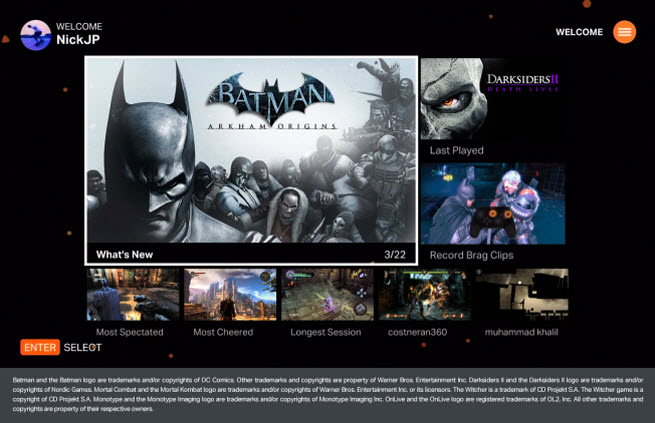OnLive said today it will wind down its operations and sell select cloud gaming assets to Sony’s game division. This brings to a close one of the boldest attempts to disrupt the traditional video game business and deliver high-end games to just about any computing device.
Terms of the deal weren’t disclosed. Sony Computer Entertainment will now hold a considerable amount of intellectual property in cloud gaming. It purchased the Gaikai game streaming service in 2012 for $380 million, and it used that to launch its PlayStation Now cloud gaming service, which streams games from data centers to PlayStation consoles. It enables players to play older games such as God of War: Ascension, a PlayStation 3 game, on newer consoles such as the PlayStation 4.
Sony Computer Entertainment is picking up certain assets of OnLive, including its U.S. and foreign patent portfolio covering “substantial innovations in cloud gaming,” the companies said. OnLive was a pioneer in creating a game service that got around the limitations of older computers or tablets. Instead of procesing a game on those devices, it processed them in the graphics hardware of a data center. Then it streamed video back to the user’s device.
While the idea was cool, OnLive stumbled in its execution and wound up going through a change in ownership that ultimately led to the deal with Sony. Cloud gaming, meanwhile, has evolved into something different, with its main proponents in Sony, Nvidia, and startups Shinra Technologies and Improbable.
“These strategic purchases open up great opportunities for our gamers, and gives Sony a formidable patent portfolio in cloud gaming. It is yet another proof point that demonstrates our commitment to changing the way gamers experience the world of PlayStation,” said Philip Rosenberg, the vice president of global business development of Sony Computer Entertainment.
OnLive had its own subscription and game rental services directly to consumers. Those users will continue to have access to OnLive’s services until April 30, including the OnLive Game Service, OnLive Desktop and SL Go (Second Life). After today, however, subscribers will no longer receive charges for these services. Those whose subscriptions renewed on or after March 28 will receive refunds. Following the termination of the company’s services and related products, OnLive will engage in an orderly wind-down of the company and cease operations.
The asset sale is a humble outcome for one of Silicon Valley and gaming’s most ambitious startups, which first told VentureBeat about its plans in 2009.
Few game companies held as much promise as OnLive had. After years of research at his think-tank, Rearden, Silicon Valley entrepreneur Steve Perlman formed OnLive in 2007 with the goal of creating cloud-based gaming (a system in which people played games that were stored and executed in broadband-connected data centers, not their own computers or consoles). They could instantly play games from any computer, the OnLive console, or even an iPad, and they didn’t have to wait a long time to download their games. The gameplay was streamed as video to users. It took a lot of Internet bandwidth.
OnLive had all of the advantages of a disruptive startup, but it simply ran out of runway. Perlman clashed with potential game providers such as Electronic Arts, which started its own online distribution service, EA Access.
OnLive had hired more than 200 employees, but the consumers never really signed up in part because OnLive offered 720p games at around 30 frames per second, when hardcore gamers really wanted 1080p games at 60 frames per second. It improved its service over time, but it was always chasing the quality of disk-based games. Nvidia, which offers the rival Grid cloud gaming network on top of Amazon Web Services, says it can offer that level of quality now. It will launch its Shield set-top box as a cloud gaming device in May.
If any problem doomed OnLive, it was that is showed up too early. In 2012, OnLive filed for a bankruptcy alternative, known as the Assignment for the Benefit of Creditors, and its assets were sold to an affiliate of Lauder Partners, headed by OnLive investor Gary Lauder. A larger group of investors, including Perlman, were wiped out. Smartphone and tablet maker HTC, one of the last firms that invested in OnLive at an estimated valuation of $1.8 billion, confirmed that it lost $40 million. Broadband Internet and communications provider British Telecom also suffered a total loss as well. That led a lot of people to do soul-searching on whether cloud gaming was viable.
Lauder continued the cloud gaming service for consumers and rebuilt the team. He brought in former IGN chief Mark Jung as executive chairman in 2014, and he relaunched new cloud-based services such as CloudLift and OnLive Go. Evidently, those new services didn’t make the company viable.
Yet cloud gaming gave some appealing strategic options to companies like Sony. Many players love buying new game systems, but others are reluctant to give up their old ones because they have built up a library of beloved games on them. With PlayStation Now, Sony offered the capability to stream older PS3 games from its data centers — for a one-time rental fee or a subscription — to players with the newer PS4. That removed a barrier to purchasing a new PS4 and widened the content available on new consoles.
Perlman once said that the work on OnLive’s patents started with a patent filing in 2002 and that the U.S. Patent and Trademark Office had granted a “fundamental patent” covering the invention of cloud-based video games. No doubt this is what Sony picked up. OnLive has about 80 employees, and Sony has a number of positions that it hopes to fill with OnLive people. But no decisions have been made yet.
Meanwhile, cloud gaming has given way to new ideas, such as Shinra Technologies and Improbable, which have their own ideas of what to do with the supercomputing capabilities of the cloud.
VentureBeat's mission is to be a digital town square for technical decision-makers to gain knowledge about transformative enterprise technology and transact. Learn More




